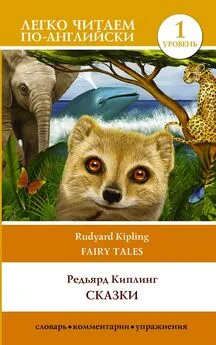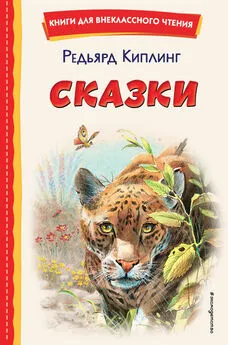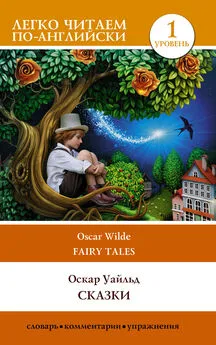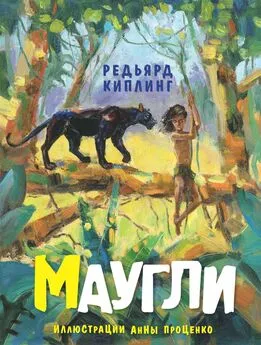Редьярд Джозеф Киплинг - Сказки / Fairy Tales. Уровень 1
- Название:Сказки / Fairy Tales. Уровень 1
- Автор:
- Жанр:
- Издательство:неизвестно
- Год:2021
- Город:Москва
- ISBN:978-5-17-132777-4
- Рейтинг:
- Избранное:Добавить в избранное
-
Отзывы:
-
Ваша оценка:
Редьярд Джозеф Киплинг - Сказки / Fairy Tales. Уровень 1 краткое содержание
Книга предназначена для тех, кто только начинает изучение английского языка (уровень 1 – Elementary).
В формате PDF A4 сохранен издательский макет книги.
Сказки / Fairy Tales. Уровень 1 - читать онлайн бесплатно ознакомительный отрывок
Интервал:
Закладка:
Редьярд Джозеф Киплинг
Сказки / Fairy Tales. Уровень 1
© Матвеев С.А., адаптация текста, комментарии, упражнения, словарь
© ООО «Издательство АСТ», 2021
Rudyard Kipling
Fairy Tales
How the Whale got his throat
In the sea, once upon a time, there was a Whale, and he ate fishes. He ate the starfish and the garfish, and the crab and the dab, and the plaice and the dace, and the skate and his mate, and the mackerel and the pickerel, and the eel. All the fishes he could find in all the sea he ate with his mouth – so! But at last there was only one small fish left [1] there was only one small fish left – осталась только одна маленькая рыбка
in all the sea, and that was a small Astute Fish [2] Astute Fish – Мудрая Рыба
, and it swam a little behind the Whale’s right ear. So the Whale could not catch it. Then the Whale stood up on his tail and said,
“I’m hungry.’
And the small Astute Fish said,
‘Noble and generous Cetacean, did you taste Man?’
‘No,’ said the Whale. ‘ What is it like? [3] What is it like? – На что это похоже?
’
‘Nice,’ said the small Astute Fish. ‘Nice but nubbly.’
‘Then fetch me some,’ said the Whale, and swam away.
‘If you swim to latitude Fifty North, longitude Forty West [4] latitude Fifty North, longitude Forty West – пятьдесят градусов северной широты, сорок градусов восточной долготы
,’ said the Astute Fish, ‘you will find a man. He is sitting on a raft, in the middle of the sea, he has only a pair of blue canvas breeches, a pair of suspenders, and a jack-knife [5] jack-knife – складной нож
. He is a shipwrecked Mariner.’
So the Whale swam and swam to latitude Fifty North, longitude Forty West, as fast as he could swim. And the Whale found one single, solitary shipwrecked Mariner. The Mariner was on a raft, in the middle of the sea. He had a pair of blue canvas breeches, a pair of suspenders, and a jack-knife.
Then the Whale opened his mouth back and back and back till it nearly touched his tail. And then he swallowed the shipwrecked Mariner and his raft, and his blue canvas breeches, and the suspenders, and the jack-knife. After that the Whale smacked his lips, and turned round three times on his tail.
But when the Mariner found himself [6] found himself – оказался
inside the Whale’s dark stomach, he stumped and he jumped and he thumped and he bumped, and he pranced and he danced, and he banged and he clanged, and he hit and he bit, and he leaped and he crept, and he prowled and he howled, and he hopped and he dropped, and he cried and he sighed, and he crawled and he bawled, and he stepped and he danced. The Whale felt very unhappy.
So the Whale said to the Astute Fish,
‘This man is very nubbly, and besides I hiccup because of him. What to do?’
‘Tell him to come out,’ said the Astute Fish.
So the Whale cried to the shipwrecked Mariner, ‘Come out and behave yourself [7] behave yourself – веди себя прилично
. I hiccup because of you.’
‘No, no!’ said the Mariner. ‘Take me home first!’
And he began to dance again.
‘You must take him home,’ said the Astute Fish to the Whale. ‘There is no other way.’
So the Whale swam and swam and swam, with both flippers and his tail, as fast as he could. At last he saw the Mariner’s land, and he rushed to the beach, and opened his mouth wide and wide and wide, and said,
‘Walk out!’
And the Mariner walked out of his mouth. But the Mariner was very cunning: he took his jack-knife and cut up the raft into a little square grating, and he tied it with his suspenders, and he dragged that grating into the Whale’s! Then he sang the song:
With this grating,
I stop your eating.
After that the Mariner stepped out on the shingle, and went home to his mother. Then he married and lived happily enough.
But from that day on, with that grating – which was in the Whale’s throat – the Whale could eat nothing except very, very small fish. That is the reason why whales nowadays never eat men or boys or little girls.
The small Astute Fish went away and hid himself in the mud. It was afraid that the Whale was angry with it.
How the Camel got his hump
In the beginning of years, when the world was so new, and the animals began to work for Man, there was a Camel. He lived in the middle of a Howling Desert [8] Howling Desert – Ревущая Пустыня
because he did not want to work. Besides, he was a Howler [9] Howler – Ревун
himself. So he ate sticks and thorns and tamarisks and milkweed and prickles. When anybody spoke to him he said ‘Humph!’ Just ‘Humph!’ and no more.
Presently the Horse came to him on Monday morning, with a saddle on his back and a bit in his mouth, and said,
‘Camel, O Camel, come out and trot like the rest of us.’
‘Humph!’ said the Camel; and the Horse went away and told the Man.
Presently the Dog came to him, with a stick in his mouth, and said,
‘Camel, O Camel, come and fetch and carry like the rest of us.’
‘Humph!’ said the Camel; and the Dog went away and told the Man.
Presently the Ox came to him, with the yoke on his neck and said,
‘Camel, O Camel, come and plough like the rest of us.’
‘Humph!’ said the Camel; and the Ox went away and told the Man.
At the end of the day the Man called the Horse and the Dog and the Ox together, and said,
‘You three, I’m very sorry for you; but that Camel in the Desert can’t work. So I want to leave him alone, and you must work double-time.’
That made the Horse and the Dog and the Ox very angry, and they discussed the situation with the Camel on the edge of the Desert. But the Camel chewed milkweed and laughed at them. Then he said ‘Humph!’ and went away again.
Presently the Djinn appeared. He was in charge of [10] in charge of – в ответе за
all deserts. The Djinn rolled in a cloud of dust (Djinns always travel that way because it is magic), and he stopped to talk to the Three.
‘Djinn of All Deserts,’ said the Horse, ‘is it right for anyone to be idle’
‘Certainly not,’ said the Djinn.
‘Well,’ said the Horse, ‘there’s a Camel in the middle of your Howling Desert with a long neck and long legs, and he does not work at all. He doesn’t want to trot.’
‘Whew!’ said the Djinn and whistled, ‘that’s my Camel! What does he say about it?’
‘He says “Humph!”’ said the Dog; ‘and he doesn’t want to fetch and carry.’
‘Does he say anything else?’
‘Only “Humph!”; and he doesn’t want to plough,’ said the Ox.
‘Very good,’ said the Djinn. ‘I’ll humph him if you wait a minute.’
The Djinn rolled himself up in his dust-cloak, and flew away. He found the Camel most idle. The Camel looked at his own reflection in a pool of water.
‘My friend,’ said the Djinn, ‘they say you don’t work. Is it true?’
‘Humph!’ said the Camel.
The Djinn sat down, with his chin in his hand, and began to think. The Camel looked at his own reflection in the pool of water again.
‘I’ll give you three tasks on Monday morning,’ said the Djinn.
‘Humph!’ said the Camel.
‘Why do you say ‘Humph!’?’ asked the Djinn; ‘I want you to work.’
And the Camel said ‘Humph!’ again. But suddenly he saw his back and was afraid: his back puffed up into a great big humph.
‘Do you see that?’ said the Djinn. ‘That’s your own humph. You don’t work, and you have it! Now begin to work!’
‘How can I work,’ asked the Camel, ‘with this humph on my back?’
‘Today is Thursday. You will be able to work now for three days without any food’ said the Djinn, ‘because you missed three days – Monday, Tuesday and Wednesday. You can live on your humph. Come out of the Desert and go to the Three. Begin to work! And behave yourself!’
And the Camel went away to join the Three. And from that day to this the Camel always wears a humph. But he doesn’t know how to behave.
How the Rhinoceros got his skin
Once upon a time, on an uninhabited island on the shores of the Red Sea, there lived a Parsee. And the Parsee lived by the Red Sea with nothing but his hat, from which the rays of the sun were reflected, and his knife and a cooking-stove. And one day he took flour and water and currants and plums and sugar and things, and made himself a cake. The cake was two feet across and three feet thick. The Parsee put it on the stove, and he baked it. He baked it till it was all brown and smelt most sentimental.
But when he wanted to eat it there came down to the beach a Rhinoceros with a horn on his nose, two piggy eyes, and bad manners. In those days the Rhinoceros’s skin was quite tight. There were no wrinkles in it anywhere. He had no manners then, and he has no manners now, and he never will have any manners. He said, ‘How!’ and the Parsee left that cake and climbed to the top of a palm tree with his hat, from which the rays of the sun were reflected. The Rhinoceros upset the oil-stove with his nose. The cake rolled on the sand, and he spiked that cake on the horn of his nose, and he ate it. And he went away. Then the Parsee came down from his palm-tree.
Five weeks later, the Red Sea was very hot, and everybody took off all the clothes they had. The Parsee took off his hat; but the Rhinoceros took off his skin and carried it over his shoulder as he came down to the beach to bathe. In those days it buttoned underneath with three buttons and looked like a waterproof. He said nothing about the Parsee’s cake. The Rhinoceros waddled straight into the water and blew bubbles through his nose. His skin was on the beach.
Presently the Parsee came by and found the skin. He smiled, and the smile ran all round his face two times. Then he danced three times round the skin and rubbed his hands. Then he went to his camp and filled his hat with cake-crumbs [11] cake-crumbs – крошки
. You know, the Parsee never ate anything but cake, and never swept out his camp. He took that skin, and he shook that skin, and he scrubbed that skin, and he rubbed that skin just as full of old, dry, stale, tickly cake-crumbs and some burned currants. Then he climbed to the top of his palm-tree and waited.
The Rhinoceros came out of the water and put it on. He buttoned it up with the three buttons, and it tickled like cake-crumbs in bed. Then he wanted to scratch, but that made it worse [12] that made it worse – стало ещё хуже
. Then he lay down on the sands and rolled and rolled and rolled, and every time he rolled the cake-crumbs tickled him worse and worse and worse.
Then he ran to the palm-tree and rubbed and rubbed and rubbed himself against it. He rubbed so much and so hard that he rubbed his skin into a great fold over his shoulders, and another fold underneath. He rubbed some more folds over his legs. But it didn’t work. The cake-crumbs were inside his skin and they tickled. So he went home, very angry indeed and horribly scratchy.
Читать дальшеИнтервал:
Закладка:










